逐句精讲新概念英语第二册第27课 雨夜
新概念第二册Lesson 27知识要点总结

新概念第二册Lesson 27复习要点一.L27词汇讲解:1.tent帐篷put up the tent 搭起帐篷2.field 田地,田野in the football field 在足球场上3.smell闻起来I don’t like the smell of this flower. 我不喜欢这种花的味道。
sound 听起来/smell 闻起来/taste尝起来/look看起来/feel感觉起来4.wonderful 极好的the seven wonders of the world 世界七大奇迹wonder----wonderful help----helpful care-----carefulhope---hopeful use----useful5.soundly 香甜地sleep soundly 睡得很香=be sound asleepsleep deeply 睡得很深=be deeply asleep6.heavilyrain heavily/snow heavily/ The wind blows heavily.风刮得很大heavy rain大雨/heavy snow大雪/heavy wind大风/heavy traffic交通拥挤7.stream小溪拓展词汇:river河流lake 湖泊sea 大海ocean海洋8.form形成A stream formed in the field after the heavy rain.大雨过后,田野里形成了一条小溪。
主意区分:form和from9.wind 蜿蜒The snake wound itself around the wire.蛇把自己缠绕在电线上。
10.right 正好I was right there.我正好在那儿。
11.creep---climb/leap---jump词语辨析:creep 爬行,水平方向有位移climb 垂直方向有位移leap 水平方向有位移的跳跃jump 垂直方向的跳二.系动词:系动词后可以加形容词作表语系动词的分类:a.be 动词b.感官动词:feel/look/sound/taste/smellc.表示变化的动词:get/go/come/become/turn/falld.保持,保存:stay/remain/keepThis sandwich has gone bad.这个三明治已经坏了。
新概念第二册lesson27

• campfire n. 营火, 篝火 • fire n. 1. 火 可数/不可数 火堆—可数, 火焰—不可数 2.射击, 炮火, 火力 Hold on your fire. 保持火力。 v. 开火 例句:他命令他的士兵开枪。 He ordered his men to fire. 解雇《口语》
• form
v. 形成 n.表格
• wind [waind] v. (wound,wound) wind one‘s way 蜿蜒而行 • 注意与名词wind[wind]的读音不同.
• right adv. 正好
强调作用 • right 做副词时强调后边的形容词, 副词, 介词短语, 不强调 动词 可用just来替换 Right here.就在这儿 Right here waiting for you 《此情可待》 • 后边加代词时只能用just. 如 : just you 就是你了. 不能用 right代替 just like 正好/just as 正如
Camping equipment first aid kit 急救用品
tent [tent]帐篷 hammer ['hæmə]锤子
sleeping bag blanket
['blæŋkit]
睡袋/毛毯; 子
毯
folding chairs
flashlight ['flæʃ,lait]手
电筒
人的感觉
感官动词:
feel, look, taste, sound, smell
feel: ⑴感到 I feel ill. (心理感到) ⑵用手的感受 The blackboard feels cold.
look: You look fine /better /beautiful. taste: [teist] 尝起来 The apple smells good, and it tastes better. sound: 听起来 It sounds good/terrible!
(完整word)新概念二L27-28讲义
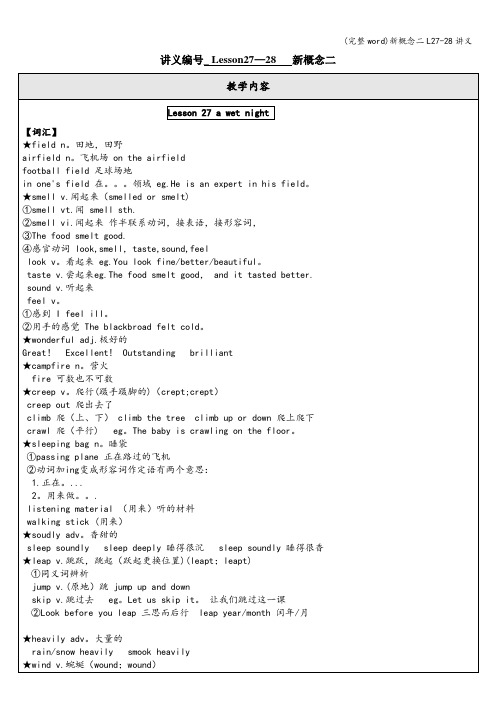
讲义编号_ Lesson27—28
新概念②27课件

新概念②27课件【英文名字名在前,姓在后】大家好,我叫菜大头,英文名叫大头菜。
A wet night雨夜★wet ( wetter , wettest ) a. 湿的;未干的;下雨的;<口>饮酒的,喝醉的wet clothes 【material 衣料】get wet in the rainHe is wet through .Her face is wet with tears . 【tear n. 眼泪(常用复数) v. ( tore , torn ) 撕开,撕裂 ~ up 撕碎】Don’t touch , wet paint .a wet driver 酒后驾车者→moist a. 潮湿的;多雨的;泪汪汪的be moist with dew 【dew n. 露水 a drop of dew 露珠】be moist with the joy of success 因成功的喜悦而眼含泪水moisture n. 潮湿;湿气;湿度;水分,降雨量→humid a. 潮湿的humidity n. 湿度;湿气→rainy a. 下雨的;多雨的a rainy month 多雨的一个月perpetually rainy 常年多雨Late in the afternoon, the boys put up their tent in the middle of a field. 傍晚时分, 孩子们在田野中央搭起了帐篷.★late in the afternoon 傍晚early in the morning 一早★the boys or some boys ?★put up 举起;搭建Put your hands up ! = Hands up !put up / hoist / raise a flagput up a tent 支起帐篷put up a fence 筑起篱笆→ put up with 容忍,忍受How can you ~ such a naughty child / so naughty a child ?!★midafternoon n. & a. 下午三点左右(的)midnight n. & a. 午夜(的);漆黑(的)midnight blue / black 深蓝/黑(?)色the Mid-Autumn Day / Festival 中秋节八月十五【张士诚,“八月十五杀鞑子”,抗元】the Dragon Boat Festival 端午节五月初五【楚怀王;驱舟寻尸不得,后演变为赛龙舟】the Lantern Festival 元宵节正月十五the Double Ninth Festival 重阳节九月初九【东汉,费长房,恒景】4.表依旧的系动词:remain, keep, stay, continue, stand, rest, lie, holdAfter a wonderful meal, they told stories and sang songs by the campfire. 他们美美地吃了一顿饭后, 就围在营火旁讲起了故事, 唱起了歌.★delicious / delicate / tasty / dainty / palatable ['pælətəbl] / toothsome / yummy★by prep.在...旁边near / beside = next to(紧邻着)/ at→at the table / at tableBut some time later it began to rain.但过了一阵子. 天下起雨来.★some time later / ago 一段时间之后/前The boys felt tired so they put out the fire and crept into their tent.孩子们觉得累了, 于是他们扑灭了篝火, 钻进了帐篷.★put out 熄灭The fire is out. 火灭了。
Lesson27Awetnight(课件)新概念英语第二册(3)
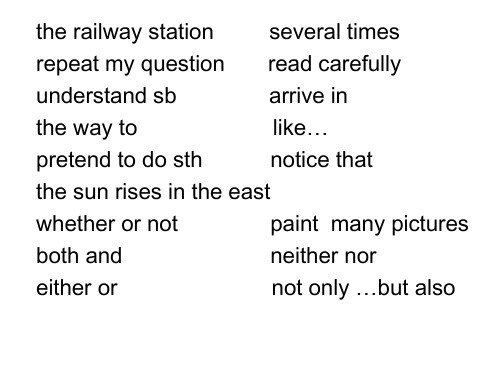
put:
• put up with 容忍,忍受
• put up 搭建,搭建; • put sb up安排住宿,为……提
供膳宿,夜宿
• put out 扑灭 • put on 穿上 • put away 把……收好,放好 • put off 推迟,拖延 • put down = write down 记
到另一边, 位置变化) • Look before you leap. 三思而后行 • leap year/month 闰年/月 • skip v. 课文行的跳过去,单词,文章
• ★form v. 形成
• ① vi. 形成,产生
• Ice forms when it is cold enough. 如果冷到一定的 程度,冰就会形成。
• ★sleeping bag 睡袋
• 动词加ing 变成形容词作定语有两个意思 : • ① 正在…… 如:sleeping dog • passing plane 正在路过的飞机 • ② 用来做…… 如:sleeping bag • listening material 听力材料; walking
• ★field n. 田地, 田野
• in the field 在田野里 • in one‘s field 在……领域
• He is an expert in his field. • • football field 足球场地
• on the airfield • =at the airport • 在机场
• open fire 在野外生的火, 篝火, 盆火(指无遮盖的、没有围起 来的火)
• cook a meal 做一顿饭
新概念英语第二册Lesson27Awetnight

te in the afternoon, the boys put up their tent in the middle
of a field. 傍晚时分,孩子们在田野中央搭起了帐篷。
(1) late in the afternoon 快到傍晚的时候
(2) put up = set up 搭起,put up 还有“提供”的意思
n. 篝火
—He's a wonderful baker. —Yes! That cake smells good.
wonderful /ˈwʌndəf(ə)l/ adj.极好的 smell /smel/ v.闻起来
What’s this?
sleeping bag 睡袋
comfortable /ˈkʌmfətəbl/ adj.舒适的 I slept very soundly, because the bed was really comfortable.
3.What did they do then? They all leapt out of their sleeping bags and hurried outside.
4.What did the boy find after they hurried outside? They found that a stream had formed in the field. The stream wound its way across the field and then flowed right under their tent!
3.soundly /ˈsaʊndli/ adv.香甜地;完全地 I slept very soundly yesterday because the bed was comfortable. The team has been soundly defeated.
A wet night雨夜-新概念英语第二册自学导读笔记第27课
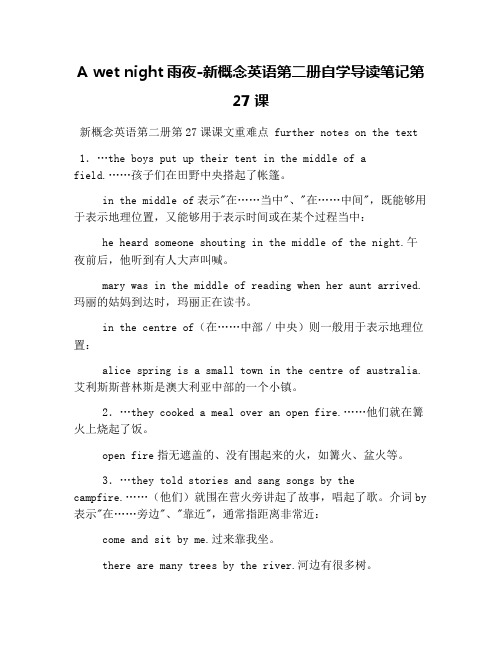
A wet night雨夜-新概念英语第二册自学导读笔记第27课新概念英语第二册第27课课文重难点 further notes on the text1.…the boys put up their tent in the middle of a field.……孩子们在田野中央搭起了帐篷。
in the middle of表示"在……当中"、"在……中间",既能够用于表示地理位置,又能够用于表示时间或在某个过程当中:he heard someone shouting in the middle of the night.午夜前后,他听到有人大声叫喊。
mary was in the middle of reading when her aunt arrived.玛丽的姑妈到达时,玛丽正在读书。
in the centre of(在……中部/中央)则一般用于表示地理位置:alice spring is a small town in the centre of australia.艾利斯斯普林斯是澳大利亚中部的一个小镇。
2.…they cooked a meal over an open fire.……他们就在篝火上烧起了饭。
open fire指无遮盖的、没有围起来的火,如篝火、盆火等。
3.…they told stories and sang songs by the campfire.……(他们)就围在营火旁讲起了故事,唱起了歌。
介词by 表示"在……旁边"、"靠近",通常指距离非常近:come and sit by me.过来靠我坐。
there are many trees by the river.河边有很多树。
4.but some time later it began to rain.但过了一阵子,天下起雨来。
新概念第二册L27分析解析
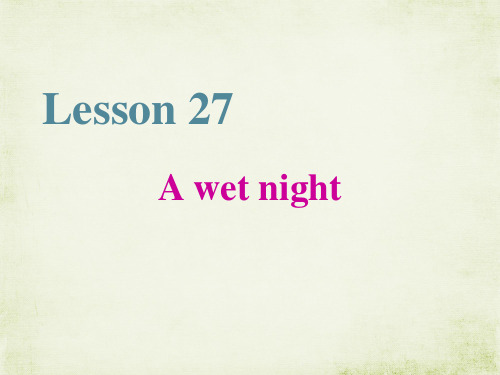
look: e.g.: You look fine /better /beautiful. taste: [teist] 尝起来 e.g.:The apple smells good, and it tastes better. sound: 听起来 e.g.:It sounds good/terrible!
What do we have to take when we go camping?
Camping equipment first aid kit 急救用品
tent [tent]帐篷 hammer ['hæmə]锤子
sleeping bag blanket 睡袋/毛毯; 毯子
folding chairs
flashlight ['flæʃ,lait]手电
筒
hiking boot
New words and expressions
tent
n. 帐篷 n. 1. 田地, 田野(大片的)
field
→ in the field 在田野里
常用搭配:airfield 停机坪 (介词用on)
airport 机场 at/in the airport football field 足球场地 battle field 战场
field
n.
2. 领域
常用搭配:
in one's field 在...领域 例句:他是他所在领域内的专家。
e.g.: He is an expert in his field.
expert
n.专家 = specialist
★wonderful
adj. 极好的
Great ! (与物相连,口语中用得更多) excellent ! adj.卓越的, 极好的(与人相连) Outstanding ! (人) 好得站了出来 Brilliant! adj.灿烂的,ቤተ መጻሕፍቲ ባይዱ闪耀的, 有才气的 Fantastic!
《雨夜》新概念二Lesson-27 A wet night

beautiful! wonderful! terrific! perfect! fantastic! excellent! super!
campfire n.篝火
camp + fire
some time later过了些时候 some time later, it began to rain.
begin doing 开始做…
In the middle of the night, two boys woke up and began shouting.
wake woke waken begin began begun
leap v.跳跃
They
all leapt out of their sleeping bags and hurried outside Think before you leap.
wonderful a.极好的
After a wonderful meal, they told stories and sang songs by the campfire. wonder + ful a. tell told told sing sang sung
It’s It’s It’s It’s It’s It’s It’s
5.Father is ____the fire he lit in the garden. putting out 6.When they have ___ that new building, it will spoil the view. put up 7.I have ___ my trip to Japan until next month. put off 8.I am getting a divorce(离婚). I can’t ____ any longer. put up with
新概念英语第二册教案Lesson27Awetnight雨夜
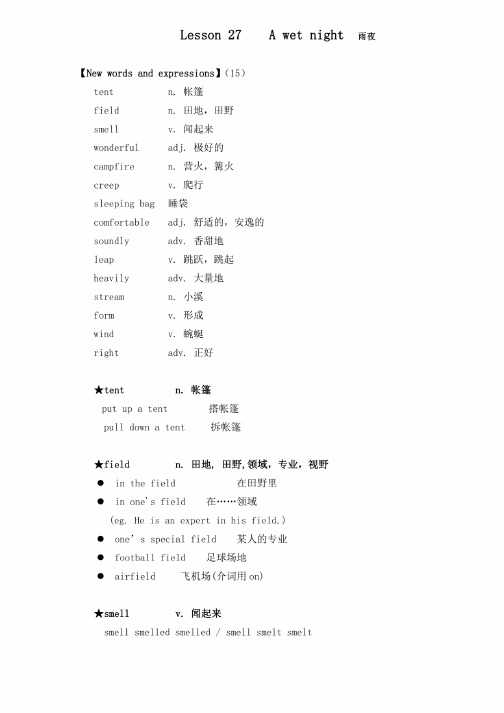
Lesson 27 A wet night 雨夜[New words and expressions] (15)tentn.帐篷field n.田地,田野smellv.闻起来wonderful adj,极好的campfiren.营火,篝火creep sleeping bag comfortable V.爬行睡袋adj,舒适的,安逸的soundly leapheavilyadv.香甜地V,跳跃,跳起adv,大量地stream n.小溪form V.形成windV.蜿蜒rightadv.正好★tent n,帐篷put up a tent 搭帐篷pull down a tent拆帐篷★field n.田地,田野,领域,专业,视野• in the field 在田野里• in one ,s field 在...领域(eg. He is an expert in his field.)• one ,s special field 某人的专业smell smelled smelled / smell smelt smelt• football field 足球场地• airfield飞机场(介词用on )★smell V.闻起来(1)(感官动词)+adj.(表语用来说明主语的身份、性质、品性、特征和状态,表语常由名词、形容词、副词、介词短语、动词的ing形式、不定式、从句来充当。
)(2)不用于被动语态,不用于进行时态Eg.The fish smells A.(主系表结构:系动词后面形容词作表语)A.goodB.nicelyC.well(类似系动词:sound听起来;look看起来;feel感觉;taste尝起来)★wonderful adj.极好的Great!(与物相连,口语中用得更多)Excellent!adj.卓越的,极好的(与人相连)She is an excellent teacher.Outstanding!(人)好得站了出来Brilliant!adj.灿烂的,闪耀的,有才气的Fantastic!adj.极好的★campfire n.营火,篝火.camp]n.营地a holiday camp度假营地a prison camp战俘营an army camp军营a concentration camp(德国纳粹的)集中营pitch a camp扎营have a foot in both camps脚踩两只船have a foot in the grave行将就木•camp V.设营,扎营,宿营,露营go camping野营,度假•campfire营火,篝火二open fire•camp bed折叠床,行军床•fire[c][u](一堆堆的火为可数,炉子里的火为不可数)★creep(crept,crept)v.爬行(蹑手蹑脚的)也是平行的爬crawl v.平行地爬(crawl使用于如蛇类,无足,以腹部着地而行或者动作迟缓之虫类,而creep则表示四足动物,缓慢而行,然而,快速前进之虫类,仍多以creep表示。
裕兴新概念英语第二册笔记 第27课教学内容

裕兴新概念英语第二册笔记第27课Lesson 27 A wet night雨夜What happened to the boys in the night?Late in the afternoon, the boys put up their tent in the middle of a field. As soon as this was done, they cooked a meal over an open fire. They were all hungry and the food smelled good. After a wonderful meal, they told stories and sang songs by the campfire. But some time later it began to rain. The boys felt tired so they put out the fire and crept into their tent. Their sleeping bags were warm and comfortable, so they all slept soundly. In the middle of the night, two boys woke up and began shouting. The tent was full of water! They all leapt out of their sleeping bags and hurried outside. It was raining heavily and they found that a stream had formed in the field. The stream wound its way across the field and then flowed right under their tent!参考译文傍晚时分,孩子们在田野中央搭起了帐篷。
新概念英语第二册:第27课课文详解及语法解析.doc
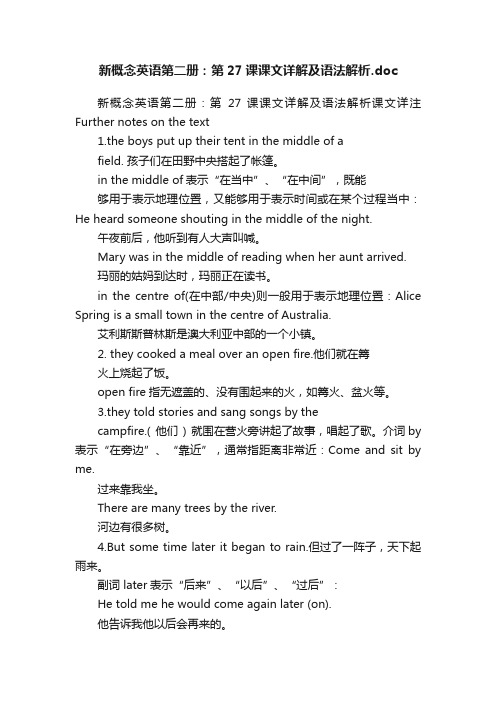
新概念英语第二册:第27课课文详解及语法解析.doc新概念英语第二册:第27 课课文详解及语法解析课文详注Further notes on the text1.the boys put up their tent in the middle of afield. 孩子们在田野中央搭起了帐篷。
in the middle of表示“在当中”、“在中间”,既能够用于表示地理位置,又能够用于表示时间或在某个过程当中:He heard someone shouting in the middle of the night.午夜前后,他听到有人大声叫喊。
Mary was in the middle of reading when her aunt arrived.玛丽的姑妈到达时,玛丽正在读书。
in the centre of(在中部/中央)则一般用于表示地理位置:Alice Spring is a small town in the centre of Australia.艾利斯斯普林斯是澳大利亚中部的一个小镇。
2. they cooked a meal over an open fire.他们就在篝火上烧起了饭。
open fire指无遮盖的、没有围起来的火,如篝火、盆火等。
3.they told stories and sang songs by thecampfire.( 他们) 就围在营火旁讲起了故事,唱起了歌。
介词by 表示“在旁边”、“靠近”,通常指距离非常近:Come and sit by me.过来靠我坐。
There are many trees by the river.河边有很多树。
4.But some time later it began to rain.但过了一阵子,天下起雨来。
副词 later表示“后来”、“以后”、“过后”:He told me he would come again later (on).他告诉我他以后会再来的。
新概念英语第二册27课 详细单词解释,短语归纳
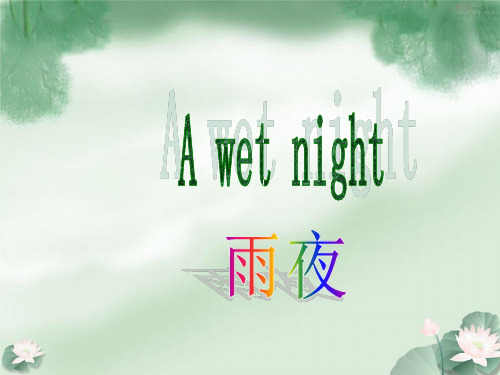
讲笑话 一会后 下雨了 感到疲惫 熄灭火 温暖又舒适 睡得香甜
tell jokes after a moment /some time later It began to rain
feel tired
put out the fire warm and comfortable sleep soundly
lateafternoonearlydone在篝火上烧饭cookmealoveropenfireopencar他们都饿了wereallhungry食物闻起来不错foodsmelledgood美餐一顿后afterwonderfulmeal讲故事tellstorieslatedone在篝火上烧饭cookmealoveropenfireopencar他们都饿了wereallhungry食物闻起来不错foodsmelledgood美餐一顿后afterwonderfulmeal讲故事tellstories讲笑话telljokes一会后aftermomentsometimelater下雨了rain感到疲惫feeltired熄灭火putoutfire温暖又舒适warmcomfortable睡得香甜sleepsoundly讲笑话telljokes一会后aftermomentsometimelater下雨了rain感到疲惫feeltired熄灭火putoutfire温暖又舒适warmcomfortable睡得香甜sleepsoundly醒来wakeup匆忙到外面hurriedoutside雨下的很大rainingheavily恰好从帐篷下面流过flowrightundertent午夜midnight醒来wakeup匆忙到外面hurriedoutside雨下的很大rainingheavily恰好从帐篷下面流过flowrightundertent午夜midnight语言差异afterwondermeal省略动词吃bag不用动词可以用介词直接表达boysputupmealoveropenfire
新概念英语第二册第27课-A wet night

新概念英语第二册第27课:A wet nightLesson 27 A wet night雨夜First listen and then answer the question.听录音,然后回答以下问题。
What happened to the boys in the night?Late in the afternoon, the boys put up their tent in the middle of a field.傍晚时分,孩子们在田野中央搭起了帐篷As soon as this was done, they cooked a meal over an open fire.这件事刚刚做完,他们就在篝火上烧起了饭They were all hungry and the food smelled good.他们全都饿了,饭菜散发出阵阵香味After a wonderful meal, they told stories and sang songs by the campfire.他们美美地吃了一顿饭后,就围在营火旁讲起了故事,唱起了歌But some time later it began to rain. The boys felt tired so they put out the fire and crept into their tent.但过了一阵子。
天下起雨来,于是他们扑灭了篝火,钻进了帐篷Their sleeping bags were warm and comfortable, so they all slept soundly.睡袋既温和又舒适,所以,他们都睡得很香In the middle of the night, two boys woke up and began shouting. The tent was full of water!午夜前后,有两个孩子醒了,大声叫了起来。
新概念英语第二册第27课 (共43张PPT)
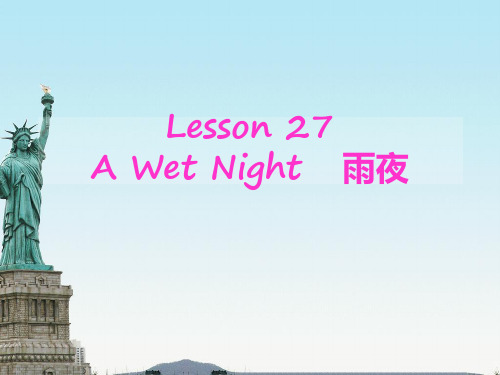
folding chair flashlight ['flæ ʃ,lait]手电筒
New words and expressions
• tent • field • smell • wonderful • campfire • creep • sleeping bag • comfortable
• 副词 later表示“后来”、“以后”、“过 后”:
• He told me he would come again later . • 他告诉我他以后会再来的。 • I met her again a few days later. • 几天以后我又遇见了她。
The boys felt tired so they put out the fire and crept into their tent.
the field • cook a meal (for sb.)(给某人)做饭 • open fire = campfire • over→(介词)在。。。之上
They were all hungry and the food smelled good.
• 【结构分析】含一般过去时的并列句,and 连
camp
n. 营地
a holiday camp
度假营地
an army camp
军营
a concentration camp (德国纳粹的)集中营
have a foot in both camps
脚踩两只船
• v. 设营,扎营,宿营,露营 • go camping 野营,度假 • eg.他们在山顶附近扎营。 • They camped near the top of the hill. • campfire 营火,篝火 • → open fire • bonfire • camp bed 折叠床,行军床
新概念第二册Lesson 27 A wet night讲义

新概念第二册Lesson 27 A wet night一、单词精讲smell(1)vt.嗅,闻:I love to smell flowers.我喜欢闻花。
I'm smelling the fish to see if it's all right.我正在闻这条鱼,看看它是否还新鲜。
I (can) smell something burning.我(能)闻到什么东西烧焦的气味。
(2)vi.闻起来有……气味,散发……气味:This fish smells bad.这鱼馊了。
You smell of soap.你身上有肥皂味。
(3)n.气味:I can't stand the smell in this room.我受不了这房间里的气味。
There is a sweet smell in the air.空气中有种芳香味。
formvi.形成,产生:During the conversation ,an idea formed in his mind.在谈话的过程中,他有了一个主意。
Ice forms when it is cold enough.如果冷到一定的程度,冰就会形成。
n.形状,外形:The ice cream is made in the form of a ball.冰淇淋做成球形。
I don't like the form of the cake.我不喜欢这蛋糕的形状。
n.表格:If you want to enter for the competition, you must fill in these forms.如果你想报名参加比赛,你必须填写这些表格。
与put有关的短语动词在第6课和第7课的语法中,我们学习了短语动词。
与put有关的短语动词我们学过put on和put out:I'm putting on my coat.我正在穿衣服。
…they put out the fire and crept into their tent.……他们扑灭了篝火,钻进了帐篷。
新概念英语第二册Lesson-27-A-wet-night(共55张PPT)

I slept soundly that day.
3.彻底地,完全地=completely
例句:日本被彻底摧毁。
Japan Βιβλιοθήκη as destroyed soundly.
4.健全地,稳健地
例句:我们步伐稳健。
We are walking soundly.
5.重重地,严厉地
例句:妈妈严厉的和我谈话。
他不能逆潮流行事。
4.(按能力分的)班级,组
She is in the A stream.
她在A班。
form v. 形成 n.表格
(1) vi.形成,产生: During the conversation, an idea formed in his mind. 在谈话的过程中,他有了一个主意。
Ice forms when it is cold enough. 如果冷到一定的程度,冰就会形成。
⑵用手的感受 The blackboard felt cold.
campfire n. 营火, 篝火
• fire n. 1. 火 可数/不可数 火堆—可数, 火焰—不可数
2.射击, 炮火, 火力 Hold on your fire. 保持火力。 v. 开火 例句:他命令他的士兵开枪。 He ordered his men to fire
I happened to meet a friend of mine in the street yesterday. 昨天我碰巧在街上遇到了我的一个朋友。
4. happen表示“碰巧或恰巧发生某事”时,还可用“It happens / happened that...”这一结构来表达。例如:
It happened that Tom and Peter were at home that day. 碰巧那天布莱恩和彼得在家了。
- 1、下载文档前请自行甄别文档内容的完整性,平台不提供额外的编辑、内容补充、找答案等附加服务。
- 2、"仅部分预览"的文档,不可在线预览部分如存在完整性等问题,可反馈申请退款(可完整预览的文档不适用该条件!)。
- 3、如文档侵犯您的权益,请联系客服反馈,我们会尽快为您处理(人工客服工作时间:9:00-18:30)。
逐句精讲新概念英语第二册:第27课雨夜Lesson27 A wet night 课文内容:Late in the afternoon, the boys put up their tent in the middle of a field. As soon as thiswas done, they cooked a meal over an open fire. They were all hungry and the food smelt good. After a wonderful meal, they told stories and sang songs by the camp fire. But some time later it began to rain. The boys felt tired so they pet out the fire and crept into their tent. Their sleeping-bags were warm and comfortable, so they allslept soundly. In the middle of the night, two boys woke upand began shouting. The tent was full of water! They all leapt out of their sleeping-bags and hurried outside. It was raining heavily and they found that a stream had formed in the field. The stream woundits way across the field and then flowed right under their tent! 语法归纳:复习一般过去时一句话总结:一般过去时的句子中经常会出现表示过去的时间状语,这些时间状语主要有:yesterday 昨天;last spring 上个春天;a few days ago 几天前;many years ago 数年前; in 1990 在1990年;last night 昨晚;this morning 今天早上;等等。
例:My father bought this suit this morning. 我父亲今天早上买了这件西装。
I dreamt of a barking dog last night. 我昨晚梦见了一条狂叫不止的狗。
He lost his wallet a few days ago. 他几天前丟了钱包。
标题:A wet night雨夜语言点:wet adj:潮湿的;有雨的 a wet season雨季 a wet day雨天逐句精讲: te in the afternoon,the boys put up their tent in the middle of a field.傍晚时分,孩子们在田野中央搭起了帐篷。
语言点关于“建立”的词和短语:1) put up 搭起,一般指临时性建筑,很快就拆除; 2) build 建造,永久、长时间地建立; 3) set up 建立,组织、机构; 4) base 建立,以……为基础而建; 5) constitute建立,政府、政党; 6) erect 建造,摩天大厦; 7) establish 建立,开创性地创建; 8) found 建立,初步地建立,有待于进一步发展和完善; 9) upbuild 建立,逐渐增高。
2. As soon as this was done, they cooked a meal over an open fire. 这件事刚刚做完,他们就在篝火上烧起了饭。
语言点1 复习Lesson 14总结的表达“一.……就”的短语: as soon as, the moment, the minute, the second, the instant, on doing等。
语言点2 this在此指代put up their tent“搭帐篷”一事,was done则是被动语态,表示“被做完”的意思。
语言点3 cook n.厨师v.做饭;杜撰,捏造;制造cook up an excuse编造借口cook up a story编故事cook up trouble制造麻烦语言点4 an open fire露天点燃的篝火关于open的表达还有:keep an open door 欢迎来客camping inthe open 露天宿营with an open hand 慷慨大方an open car敞篷车in the open air 在野外sleep in the open 露宿an open question尚未解决的问题an open market露天市场 3. They wereall hungry and the food smelled good. 他们都饿了,饭菜香气扑鼻。
语言点1 all常常放在实义动词之前、助动词和系动词之后,在此表示强调。
all作形容词意为“全部的”,作副词意为“完全”。
All the windows are open.所有的窗子都开着。
I am all the better for that experience.我对那样的经验很老道。
语言点2 hungry adj.(使人)饥饿的;渴望的 hungry work非常累人的工作 hungry eyes渴望的眼睛语言点3 smell, scent, odour, aroma, fragrance作名词表示“气味”时的区别:1) smell是最普通用词,只表示气味,是香味还是难闻的气味,取决于限定词:It is the smell of ripe oranges. 这是熟了的橙子的香味。
2) scent表示某物散发出的、通常是使人愉快的气味:Fresh roseshave deep scent. 新鲜的玫瑰会散发出浓郁的香味。
3) odour表示浓重的、有时是令人极不愉快的气味The odours clung to her kitchen clothes. 她在厨房穿的衣服上有农重的气味。
4) aroma, fragrance 表示香味,既可以是闻到的香味,也可以是品尝到的香味:Lavender has a delicate fragrance. 熏衣草有一种淡淡的香味。
4. After a wonderful meal, they told stories and sang songs by the campfire.他们美美地吃了一顿饭后,就围着篝火讲故事、唱歌。
语言点1 wonderful meal = square meal丰盛的一餐语言点2 tell, instruct, inform表示“把某消息或某件事转达给别人”的区别:1) tell是常用词,非正式用语,含义是“把某事告诉某人;指示”。
Glancing at her scornfully, he told her that the dress was sold. 他轻蔑地看了她一眼,告诉她说那件衣服已经卖了。
(Lesson 57) He has been able totell us more about active volcanoes than any man alive. 他比任何在世的人都能更多地向我们讲述有关活火山的情况。
(Lesson67) 2) instruct是正式用语,表示给某人以指示、通知,基本含义为“教授”。
一般用于上级对下级或长辈对晚辈的指示。
The editor at once sent the journalist a telegram instructing him to find out the exact number of steps and the height of the wall. 编辑立即给这位记者发了一份电报,叫他查明台阶的准确数目以及围墙的高度。
(《新概念英语》3册Lesson5) 3) inform表示向某人传递信息,告知所发生的情况或有关资料。
I have just received a letter from my old school informing me that my former headmaster, Mr. Stuart Page, will be retiring next week. 我刚接到母校的一封信,通知我说我以前的校长斯图亚特•佩奇先生将于下星期退休。
(Lesson 85) 5. But some time later it began to rain. 但过了一阵儿,天下起雨来。
语言点1 some time later = a short time /while later 过了一阵儿语言点2 比较学习sometime某时sometimes有时some time一段时间some times若干次 6. The boys felt tired so they put out the fire and crept into their tent. 他们有点疲惫了,于是扑灭了篝火,钻进了帐篷。
语言点1 比较学习tired, weary, exhausted累的,疲倦的1) tired为常用词,泛指由于劳动过度、工作紧张导致疲乏的。
I am tired with swimming.我游泳游累了。
2) weary指由于连续不断地进行某项活动而引起疲劳,以致感到厌烦的。
At last, weary with walking, they fell asleep. 最后,因为走得十分疲念,他们都睡着了。
3) exhausted指筋疲力尽的。
Her strength was exhausted and she fell back on the pillow. 她筋疲力尽,又躺在枕头上。
语言点2 put常用相关短语put out扑灭,熄灭put sb up留宿某人put up with sb.容忍某人put down写下,记下put off推迟put sth away把某物摘在一边put sth. on穿上,戴上put up建立,搭起语言点3 总结学习有关“爬”的短语creep into爬进creep out of从……爬出creep over爬上creep away爬走,偷偷溜走7. Their sleeping bags were warm and comfortable, so they all slept soundly. 他们的睡袋又暖和又舒服,所以他们都睡得很香。
